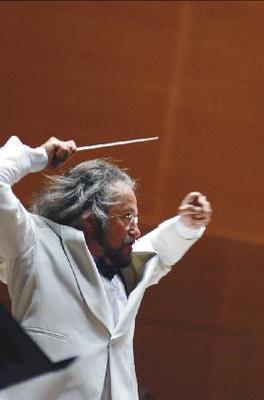 “Symphony with a Twist” is the name of the Baltimore Symphony Orchestra’s concept that tries to draw a young audience to their concerts. Rumors have it that these concerts once were cool – getting (and retaining) a Martini-glass clinking crowd of mid-twenties and early thirties to the Meyerhoff Hall. Not so much on Friday at the Strathmore. Yes, there was some fine jazz being played by Wayne Wilentz & Co to three or four people timidly moving along to the beat, and a few youngish people showed up (many with their parents… eeeewy) – but it was more sad and dull than hip and exciting. Then again, where are the young people supposed to come from? Certainly not from Montgomery County. There are a lot of BSO programs that I’d love to see at Strathmore that aren’t coming down to DC – but the one that tries to put a ‘twist’ into a symphony probably need not have made the cameo in a county that has the highest average age in the region.
“Symphony with a Twist” is the name of the Baltimore Symphony Orchestra’s concept that tries to draw a young audience to their concerts. Rumors have it that these concerts once were cool – getting (and retaining) a Martini-glass clinking crowd of mid-twenties and early thirties to the Meyerhoff Hall. Not so much on Friday at the Strathmore. Yes, there was some fine jazz being played by Wayne Wilentz & Co to three or four people timidly moving along to the beat, and a few youngish people showed up (many with their parents… eeeewy) – but it was more sad and dull than hip and exciting. Then again, where are the young people supposed to come from? Certainly not from Montgomery County. There are a lot of BSO programs that I’d love to see at Strathmore that aren’t coming down to DC – but the one that tries to put a ‘twist’ into a symphony probably need not have made the cameo in a county that has the highest average age in the region.The program started with Offenbach’s overture to Orphée aux enfers. Or, to be more precise, it did so after a speech that the Viennese/Uruguayan conductor Carlos Kalmar amiably staggered through with some humor. Ditto before the Linz symphony of Mozart, where the speech rivaled the symphony in length. It is important for an orchestra to play Mozart every so often, but it isn’t easy. Maestro Kalmar must know Wolfgang Amadeus Mozart’s music inside out, living and working in Vienna as he does, but even he could not prevent a flattened and doughy interpretation that lacked much of the zany quality of the work. (The recent recording with Bélohlávek and the Prague Philharmonic shows how it can be done.)
For the Wagner "Vorspiel und Liebestod" from Tristan und Isolde, the City Dance Theater was summoned on stage to do an interpretive dance to the music. The allusion was one of a soldier being called to the military at the eve of World War I. Maybe it took place in Paris, maybe in Schweinfurt, maybe in Niederöblarn. Not that I was able to discern that on my own – but the Maestro said so, in his third lengthy talk… and did so not before he furthered the myth that Tristan and Isolde need a love potion to explain their fate. (Maybe at the MET, where two obese ‘lovers’ need all the help they can get.)
Cecelia Porter, Baltimore Symphony Orchestra (Washington Post, October 10) |
Richard Strauss’s Rosenkavalier Suite (the actual suite is not his – but the content is) was the last work on the program. Of course Herr Kalmar couldn’t get that under way without taking a dig at Bavarians trying to compose a Viennese opera. Of course that shouldn’t have been surprising. Everyone knows that the Viennese are jealous snakes. Naturally, I was shaking with anger inside my Lederhosen. (I am not kidding either… well, at least not about the Lederhosen part.)
The suite is not very smooth at the seams – but it is a decent compendium of so much beautiful music. It wasn’t played quite as well as the Wagner, but well enough to bring enjoyment to my Richard Strauss-starved Bavarian soul. Also good enough to get standing ovations that demanded a little encore. Not bad, I guess… for a Viennese, at least.
P.S. Carlos Kalmar has - all jest aside - made some very fine recordings, in particular the Joachim Violin Concerto with the excellent Rachel Barton-Pine and orchestral works of the American composer Robert Kurka, whose second symphony sounds a little like "Shostakovich on the cheap" - but is really quite good.
Jens, no space to mention American composer Robert Kurka's opera THE GOOD SOLDIER SCHWEIK, as well as Kurka's (who died tragically young) second symphony?
ReplyDeleteIn my opinion, the Washington National Opera company should be considering mounting the Kurka opera. (That is, since it already did Krasa's opera, now called "Engagement in a Dream", it should probably also do the Kurka opera.)
https://www.cedillerecords.org/062.html
kalmar didn't conduct the schweik, as far as i know. if i had swerved and turned this into a comment on kurka - out of nowhere - people might have complained about the length of the review?! :)
ReplyDeletejfl
naturlich, i woulda been reading, had man ein bisschen geschwervt, aber some other people have short ... attention spans.
ReplyDeleteThe Viennese may be all that but Grazer, on the other hand, are very musical, deeply kind and sehr gemutlich...
ReplyDelete